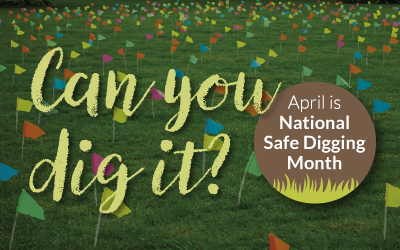Don’t let out of sight be out of mind

Your own treasure map
An underground line is damaged every three minutes nationwide and nearly 1,300 damages are reported to Georgia 811 each month. About 40% of those reports are to natural gas facilities, reports Common Ground Alliance. Damage to underground lines can result in service interruptions, costly repair bills and fines. Hitting a line can also cause serious harm to the digger and other individuals. Carelessly striking a pipeline is the most common cause of natural gas emergencies.
Knowing the location of underground utility lines reduces the
likelihood of damaging one to less than 1%.
Nearly all these accidents could have been prevented just by contacting 811 before digging. Knowing the location of underground utility lines reduces the likelihood of damaging one to less than 1%.
Never assume
Homeowners often make risky assumptions about whether or not they should get their utility lines marked, but every digging job requires a call — even small projects like planting trees and shrubs, cautions Sara Beddington, Walton Gas communications coordinator.
“Never assume you know what’s below,” she said. “Any dig, any depth, always warrants contacting Georgia 811.”
Georgia’s “Call Before You Dig” law, also known as the Georgia Underground Facility Protection Act (GUFPA), mandates contacting Georgia 811 before beginning any mechanized digging or excavation work. State law does not require Georgia 811 notification for smaller, non-mechanized digging projects, but residents are encouraged to do so to ensure their personal safety and the safety of those around them.
Whether digging with shovels or mechanized equipment, Georgia 811’s service is free of charge.
Steps to safer digging
- Provide advance notice. Contact Georgia 811 online or by phone at least three full business days (but no more than 10 days) prior to digging to ensure utility lines are properly marked. Be prepared to provide the location and description of your digging project.
- Utilities mark underground lines. 811 will notify affected utilities that will then send professional locators to the dig site to mark the exact location of any underground lines.
- Understand the location marks. Each type of buried utility has its own color code. For instance, yellow signifies a natural gas line. Marks may be painted or located with flags. See the color code map table below for specific information.


